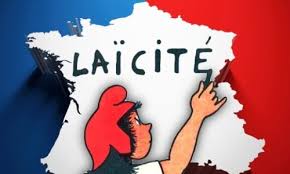Ahmedabad
(Head Office)Address : 506, 3rd EYE THREE (III), Opp. Induben Khakhrawala, Girish Cold Drink Cross Road, CG Road, Navrangpura, Ahmedabad, 380009.
Mobile : 8469231587 / 9586028957
Telephone : 079-40098991
E-mail: dics.upsc@gmail.com

Understanding Laïcité, the French principle of secularism
News: Recently, the French government announced that the practice of wearing abaya would be banned in staterun schools as it violated the principle of Laïcité, which is the French idea of secularism.
What is the Principle of Laicite in French?
• Laïcité is a principle in France that separates the power of the state from religious organizations. It guarantees freedom of conscience, which means that everyone has the right to express their beliefs or convictions within the limits of public order.
• Laïcité implies the neutrality of the state and imposes equality for all before the law, without distinction of religion or conviction.
• It guarantees believers and nonbelievers the same right to freedom of expression of their beliefs or convictions.
What are the similarities between Indian and French Secularism?
• Both Indian and French secularism uphold the principle of freedom of religion. For example, Article 25 of the Indian Constitution and France (under certain restrictions) guarantee citizens the right to practice their religion without discrimination or persecution.
• Discrimination on the basis of religion is neither allowed in India (under Article 14) nor in France.
• India (under Article 29) and France have a commitment to protecting the rights of religious minorities.
• State should not favor any particular religion.
• In both India and France, there is a focus on secular education. Religious education is generally kept separate from public education.
What are the differences between Indian and French Secularism?
Relation between state and religion
• While French Secularism emphasizes a strict separation of religion and state, the Indian system relies more on what can be termed as a ‘Principled Distance approach.’ In India, the State is allowed to interfere in secular aspects of religions or in those religious practices which it finds oppressive or discriminatory in nature.
Freedom of expression vs Religion
• The French concept encourages absolute Freedom of expression and a spirit of inquiry. It gives primacy to Freedom of Expression over religious sentiments.
• On the other hand, India has a balanced approach. It puts reasonable restrictions on Freedom of Speech in order to maintain respect for all religions.
Right to Religion
• French Secularism does not recognize one’s Right to Profess Religion. While the Indian Constitution recognizes the Right to Profess, Propagate, Practice Religion as a Fundamental Right.
State funding of Religious institutions
• India allows state funding for religious institutions but France strictly prohibits it as part of its laïcité principle.
Religion in Public Sphere
• The French system considers religion a strictly private matter and prevents any religious expression in the public sphere. For example, the French government banned wearing religious symbols in schools such as a cross, burqa etc.
• India, on the other hand, recognizes individual and community rights to practice religion and express their religious identity in the public sphere.
Positive discrimination
• The Indian model of Secularism, unlike the French model recognizes the need to protect minorities. The Indian Constitution has put in place various provisions that discriminate positively in favor of religious and cultural minorities, such as Article 29 and 30 of the Constitution.
What are the Challenges Associated with Laïcité principle?
• Critics argue that Laïcité is sometimes used as a tool to oppress religious communities. They see it as an impediment to religious freedom and the integration of minority communities.
• Some view Laïcité as a pretext for policing clothing choices, which can be seen as an intrusion on personal freedom.
• Muslim women choose to wear the headscarf and abaya as a matter of personal religious faith and identity. They argue that the ban on headscarves and abayas is an infringement on their right to practice their faith and cultural identity.
Conclusion
• Laïcité is a deeply ingrained principle in French society, but its application in a changing demographic landscape has sparked significant debates and controversies.
• Finding a balance between preserving secularism, respecting religious freedom, and promoting social integration remains a complex and ongoing challenge for France.

Address : 506, 3rd EYE THREE (III), Opp. Induben Khakhrawala, Girish Cold Drink Cross Road, CG Road, Navrangpura, Ahmedabad, 380009.
Mobile : 8469231587 / 9586028957
Telephone : 079-40098991
E-mail: dics.upsc@gmail.com
Address: A-306, The Landmark, Urjanagar-1, Opp. Spicy Street, Kudasan – Por Road, Kudasan, Gandhinagar – 382421
Mobile : 9723832444 / 9723932444
E-mail: dics.gnagar@gmail.com
Address: 2nd Floor, 9 Shivali Society, L&T Circle, opp. Ratri Bazar, Karelibaugh, Vadodara, 390018
Mobile : 9725692037 / 9725692054
E-mail: dics.vadodara@gmail.com
Address: 403, Raj Victoria, Opp. Pal Walkway, Near Galaxy Circle, Pal, Surat-394510
Mobile : 8401031583 / 8401031587
E-mail: dics.surat@gmail.com
Address: 303,305 K 158 Complex Above Magson, Sindhubhavan Road Ahmedabad-380059
Mobile : 9974751177 / 8469231587
E-mail: dicssbr@gmail.com
Address: 57/17, 2nd Floor, Old Rajinder Nagar Market, Bada Bazaar Marg, Delhi-60
Mobile : 9104830862 / 9104830865
E-mail: dics.newdelhi@gmail.com